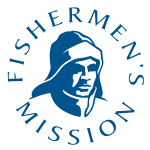
Fishing is the activity of trying to catch fish. Fish are often caught as wildlife from the natural environment, but may also be caught from stocked bodies of water such as ponds, canals, park wetlands and reservoirs. Fishing techniques include hand-gathering, spearing, netting, angling, shooting and trapping, as well as more destructive and often illegal techniques such as electrocution, blasting and poisoning.

A fisherman or fisher is someone who captures fish and other animals from a body of water, or gathers shellfish.

Sir Wilfred Thomason Grenfell was a British medical missionary to Newfoundland, who wrote books on his work and other topics.

A fishing trawler is a commercial fishing vessel designed to operate fishing trawls. Trawling is a method of fishing that involves actively dragging or pulling a trawl through the water behind one or more trawlers. Trawls are fishing nets that are pulled along the bottom of the sea or in midwater at a specified depth. A trawler may also operate two or more trawl nets simultaneously.

A well smack was a type of traditional fishing boat in use in the United Kingdom and then the Faroe Islands between the late 18th century and around 1920. It had a well amidships. The well was filled with circulated external water, which kept fish alive until delivered to land and sold. It was a modified form of a fishing smack.

St. Anthony is a town on the northern reaches of the Great Northern Peninsula of the Canadian province of Newfoundland and Labrador. St. Anthony serves as a main service centre for northern Newfoundland and southern Labrador. St. Anthony had a population of 2,180 in 2021, compared with 2,258 in 2016, 2,418 in 2011, 2,476 in 2006 and 2,730 in 2001.
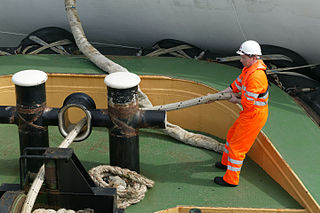
The Mission to Seafarers is a Christian welfare charity serving merchant crews around the world. It operates through a global Mission 'family' network of chaplains, staff and volunteers and provides practical, emotional and spiritual support through ship visits, drop-in seafarers centres and a range of welfare and emergency support services.
The Grenfell Mission was a philanthropic organization that provided medical and social services to people in rural communities of northern Newfoundland and Labrador. It was founded by Sir Wilfred Grenfell in 1892 as a branch of The Royal National Mission to Deep Sea Fishermen based in Britain.
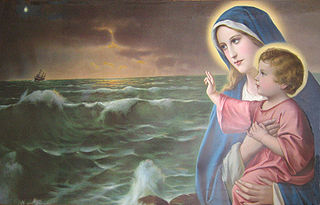
Stella Maris is an international agency of the Catholic Church that provides pastoral care to seafarers, other maritime workers, and their families.
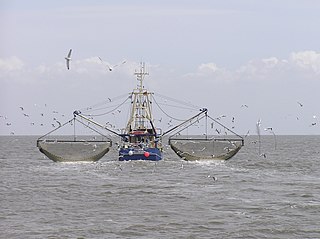
A fishing vessel is a boat or ship used to catch fish and other valuable nektonic aquatic animals in the sea, lake or river. Humans have used different kinds of surface vessels in commercial, artisanal and recreational fishing.

The Seafarers' Charity is the leading grant-making charity that has been helping people in the maritime community for over 105 years, by providing vital funding to support seafarers in need and their families. The charity supports organisations and projects that make a real difference to people's lives across the Merchant Navy, Fishing Fleets, Royal Navy and Royal Marines.

Fishing is a prehistoric practice dating back at least 70,000 years. Since the 16th century, fishing vessels have been able to cross oceans in pursuit of fish, and since the 19th century it has been possible to use larger vessels and in some cases process the fish on board. Fish are normally caught in the wild. Techniques for catching fish include hand gathering, spearing, netting, angling and trapping.
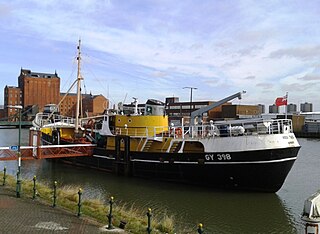
Ross Tiger is a traditional side-winder fishing trawler that was converted into a museum ship in 1992. She is currently berthed in Alexandra Dock at her home port of Grimsby, close to the site of the former PS Lincoln Castle. She forms the star attraction of North East Lincolnshire County Council's National Fishing Heritage Centre since restored and opened to the public in 1992. As Grimsby's last traditional sidewinder 'conventional trawler', she represents a now virtually extinct breed of vessels that once made up the largest fishing fleet in the world.

The Overseas Patrol Squadron is a front-line squadron of the Royal Navy with responsibility for patrolling the UK's Extended Fisheries Zone, both at home and around British Overseas Territories. The squadron, with headquarters at HMNB Portsmouth, is equipped with eight of the River-class patrol vessels.

The English Channel scallop fishing dispute, also called the Great Scallop War or guerre de la coquille, occurred on 10 October 2012 or 8 October 2012, between British and French fishermen in the Channel 24 kilometres (15 mi) off the coast of Le Havre, France. The dispute arose because of a difference in fishing restrictions between the two countries. British scallop fishers are allowed to fish for scallops year round, whilst French scallop fishers are not permitted to fish between 15 May and 1 October each year. Other confrontations took place in the same area on 28 August 2018 and 13 October 2020.

A Brixham trawler is a type of wooden, deep-sea fishing trawler first built in Brixham in Devon, England, in the 19th century and known for its high speed. The design was copied by boat builders around Britain, and some were sold to fishermen in other countries on the North Sea.
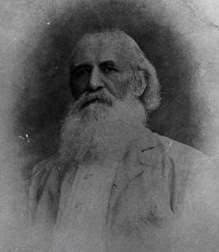
Ebenezer Joseph Mather was the founder of The Royal National Mission to Deep Sea Fishermen now often abbreviated as the Fishermen's Mission. He is affectionally remembered as 'the fisherman's friend'.
Kirkina Mucko also known as Elizabeth Mukko, (1890-1970) was a Canadian Inuit nurse and midwife. Having lost her legs as a child, and possibly her parents, she was raised in a series of mission homes, hospitals and boarding schools. Returning from abroad around 1908, she worked at the Grenfell Mission in Labrador. After losing family members in the 1918 flu pandemic, Mucko trained as a nurse and midwife, providing services for her community until her later years. A women's shelter in Rigolet has been named in her honor.

SS Joseph & Sarah Miles (LO175) was a ‘mission ship’, constructed for the Royal National Mission to Deep Sea Fishermen and operated from 1902 until 1930. She acted as a hospital ship during the Dogger Bank incident on the night of 21/22 October 1904, when the Russian Baltic Fleet mistook a British trawler fleet for the Imperial Japanese Navy and fired on them in the North Sea.
Junella was a fishing trawler, best known for her service with the Royal Navy during the Falklands War. She was built in 1975 for J Marr & Son, a Hull-based fishing company. On 11 April 1982 she was taken up from trade by the British government and commissioned into the Royal Navy. She was fitted with Second World War era minesweeping gear at Rosyth Dockyard, manned by Royal Navy sailors and allocated to the 11th Mine Countermeasures Squadron. She sailed on 26 April but was unable to commence sweeping until after the 14 June Argentine surrender. In the meantime she was utilised to transfer troops and stores between ships and landed special forces troops at San Carlos. Demining operations commenced on 21 June. Junella returned to the United Kingdom on 11 August, carrying a defused Argentine mine.
